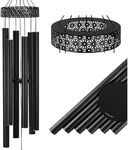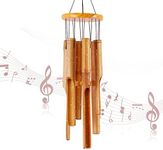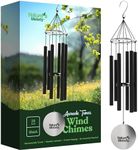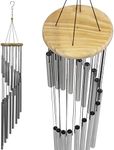Buying Guide for the Best Chimes
Choosing the right chimes can enhance the ambiance of your home or garden, providing a soothing and pleasant sound. When selecting chimes, it's important to consider several key specifications to ensure you get the best fit for your needs. Understanding these specifications will help you make an informed decision and find chimes that will bring joy and tranquility to your space.MaterialThe material of the chimes affects both the sound and durability. Common materials include metal, wood, and bamboo. Metal chimes, such as those made from aluminum or brass, tend to produce a clear, resonant sound and are highly durable. Wooden chimes offer a softer, more natural tone and blend well with outdoor environments. Bamboo chimes provide a gentle, hollow sound and are often chosen for their eco-friendly properties. Consider the type of sound you prefer and the environment where the chimes will be placed when selecting the material.
SizeThe size of the chimes influences the pitch and volume of the sound they produce. Larger chimes typically create deeper, more resonant tones, while smaller chimes produce higher-pitched, lighter sounds. If you want a prominent, soothing presence, larger chimes might be the right choice. For a subtle, delicate sound, smaller chimes are ideal. Think about the space where you will hang the chimes and how you want them to interact with the surroundings.
Number of TubesThe number of tubes in a set of chimes affects the complexity and richness of the sound. More tubes generally mean a fuller, more harmonious sound with a wider range of notes. Chimes with fewer tubes produce simpler, more straightforward melodies. If you enjoy intricate, layered sounds, opt for chimes with more tubes. For a minimalist, uncomplicated sound, fewer tubes will suffice. Consider your personal preference for sound complexity when choosing the number of tubes.
TuningChimes can be tuned to specific musical scales or left untuned. Tuned chimes are designed to produce harmonious notes that complement each other, often following a particular musical scale like pentatonic or major. Untuned chimes produce a more random, natural sound. If you appreciate musical harmony and want a specific melodic pattern, choose tuned chimes. For a more organic, unpredictable sound, untuned chimes are a good option. Your preference for musicality versus natural randomness will guide this choice.
Design and AestheticsThe design and aesthetics of the chimes contribute to the overall look and feel of your space. Chimes come in various styles, from traditional to modern, and can feature decorative elements like beads, carvings, or painted designs. Consider the existing decor of your home or garden and choose chimes that complement it. Whether you prefer a rustic, elegant, or whimsical look, there are chimes to match your aesthetic preferences. Think about how the chimes will visually enhance your environment as well as their auditory impact.
















